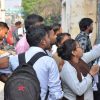No products in the cart.
United States: Visas cloud over universities
America’s higher education institutions are at risk of being caught in the crossfire as divisions are revealed in the Trump administration over visas. Opposition to the H-1B work visa has come from influential right-wing commentator Steve Bannon and left-wing Democratic senator Bernie Sanders, who have criticised the skilled foreign worker programme as “cheap labour.” President Donald Trump himself was opposed to it during his first presidency, but thanks to the vocal backing of his “first buddy” and billionaire backer Elon Musk, the president has recently voiced support for the visa.
Stephen Yale-Loehr, a retired professor of immigration law practice at Cornell University, told Times Higher Education that discussions over H-1B work visas are tied into a wider debate around immigration in general. “H-1B work visas are a common pathway for international students to work in the United States after they graduate. If the Trump administration restricts H-1B visas, international students may be less likely to attend US universities,” he says.
Although its modernisation and liberalisation are long overdue, Rajika Bhandari, principal of Rajika Bhandari Advisors, an international education research and strategy firm, agrees that curtailing or eliminating H-1B visas would have “dire consequences for US higher education, economy, and society of an unimaginable magnitude”. “The H-1B visa is a critical linchpin in the pathway of educating and employing global talent,” she says.
As well as being opposed to H-1B visas, the first Trump administration also drafted a regulation to restrict optional practical training (OPT) visas — a temporary form of employment that allows foreign graduates to remain in the country to work for 12 months to acquire workplace experience.
Stephen Miller, incoming deputy chief of staff for policy, is known to be opposed to the OPT programme. However, a report published last year found that the US could lose up to 43 percent of its current international student population if OPT is eliminated. Because it was not created by legislation, it has always been vulnerable, says Bhandari.
“As with the H-1B visa, eliminating or drastically reducing the scope of OPT would have far-reaching damaging consequences, the first of which would be that the number of international students coming to the US would drop precipitously and the country will lose the ability to attract global talent,” she warns.
While visa changes would damage the sector’s international recruitment and financial standing, David Hopkins, a political science professor at Boston College, says there is still a lot of uncertainty. “Trump has no particular sympathy for American higher ed, and is unlikely to be warned off a restrictionist approach by the argument that it would hurt the educational sector. But if Musk and his other supporters in the tech industry can prevail in convincing Trump that student and H-1B visas are important to their own interests, he’s less likely to impose policies that seriously threaten American universities,” says Hopkins.

















Add comment